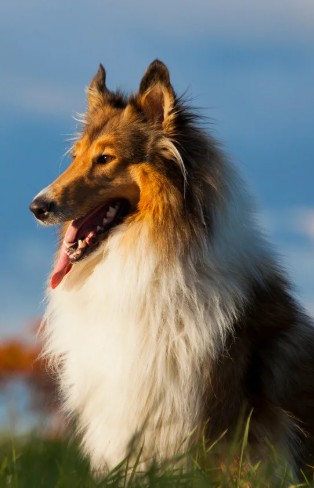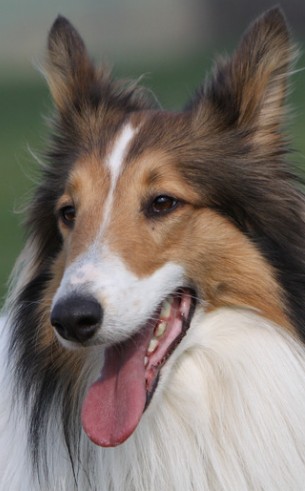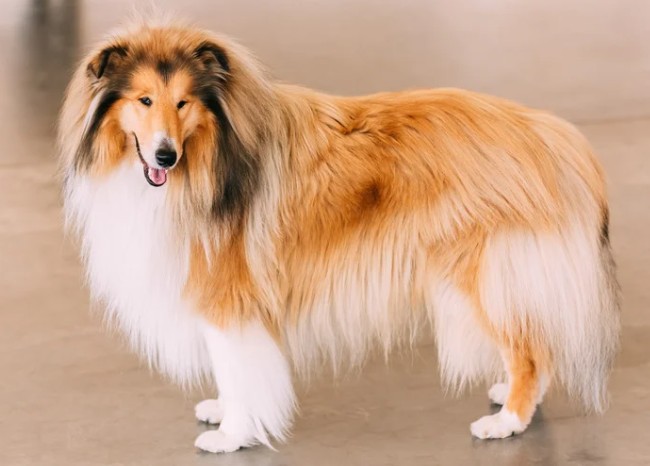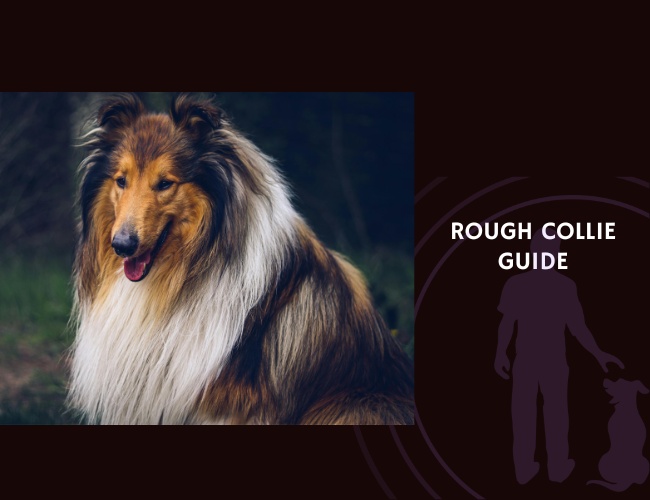From the misty highlands of Scotland to the hearts of families worldwide, the Rough Collie has journeyed through centuries as one of humanity’s most devoted companions. You might recognize this majestic breed from the beloved Lassie films, but there’s so much more to discover about these intelligent, sensitive souls who carry the legacy of their herding ancestors in every graceful stride.
Whether you’re considering welcoming a Rough Collie into your life or seeking to deepen your understanding of your current furry friend, let us guide you through the fascinating world of this remarkable breed. With their flowing coats catching the wind and their gentle eyes reflecting centuries of partnership with humans, Rough Collies offer a unique blend of intelligence, loyalty, and emotional depth that sets them apart in the canine world.
Character & Behavior: The Heart of Your Highland Herder
Understanding your Rough Collie’s character means appreciating the delicate balance between their working heritage and their modern role as beloved family companions. These dogs carry within them the echoes of Scottish moors and the responsibility of protecting flocks, yet they’ve adapted beautifully to life as sensitive, devoted family members.
Innate Herding Instincts and Behavioral Residue
Did you know that your Collie’s tendency to circle around playing children isn’t just quirky behavior? It’s actually a beautiful expression of centuries-old herding instincts. These behaviors, deeply rooted in their evolutionary history, manifest in fascinating ways:
- The gentle heel nip: When your Collie lightly touches ankles with their nose or teeth, they’re not being aggressive – they’re using an ancient herding technique passed down through generations
- Circular movement patterns: You might notice your furry friend creating invisible boundaries around family members, especially during outdoor activities
- Intense focus on movement: That laser-like attention to joggers, cyclists, or even falling leaves? It’s their ancestral programming responding to motion
These behaviors tell a story of purpose and dedication. Rather than viewing them as problems to solve, consider them windows into your dog’s rich heritage. By providing appropriate outlets – like herding balls or structured agility work – you’re honoring their natural instincts while channeling them constructively.
Emotional Sensitivity and Conflict Avoidance
Your Rough Collie experiences the world through a lens of heightened emotional awareness. This sensitivity, while making them wonderfully attuned companions, also means they navigate their environment with careful consideration:
Physical manifestations of sensitivity include:
- Lowered ears when sensing tension
- Tucked tails during moments of uncertainty
- Seeking proximity to trusted humans when anxious
Recent research into canine behavior suggests that what we sometimes interpret as “shyness” may actually be sophisticated conflict avoidance strategies. Your Collie isn’t being timid – they’re making calculated decisions to maintain harmony in their environment. This emotional intelligence makes them exceptional at reading family dynamics and responding with appropriate supportive behaviors.
When your Collie exhibits these sensitive responses, they’re not showing weakness. Instead, they’re demonstrating the nuanced emotional processing that makes them such intuitive companions. Supporting them means creating predictable, calm environments where their sensitivity becomes a strength rather than a source of stress. 🧡
Attachment Dynamics and Social Monitoring
The bond between you and your Rough Collie runs deeper than simple companionship. These dogs engage in what behavioral scientists call “social monitoring” – a constant, gentle awareness of their human family’s emotional and physical states.
How your Collie shows attachment:
- The Collie lean: That gentle pressure against your leg isn’t just affection – it’s a tactile connection that reinforces your bond
- Eye contact communication: Unlike many breeds, Collies maintain soft, prolonged eye contact as a form of emotional check-in
- Positional awareness: Notice how your Collie often positions themselves where they can see all family members?
This intense social awareness means your Collie likely knows your daily routines better than you do. They anticipate your needs, often appearing with a toy when you’re stressed or settling quietly nearby when you need to focus. This isn’t coincidence – it’s the result of generations of breeding for dogs who could work in seamless partnership with their handlers.
Inter-Canine Communication and Play Style
Watching your Rough Collie interact with other dogs reveals a sophisticated communication style that blends playfulness with diplomatic skill. Their approach to canine social situations reflects both their herding heritage and their conflict-avoidant nature:
Collie communication signatures:
- Melodic vocalizations ranging from soft “woo-woos” to conversational grumbles
- Play bows accompanied by gentle tail wags
- Strategic use of space during play, often creating circles around playmates
Their play style tends toward the cerebral rather than the physical. While a Labrador might engage in enthusiastic wrestling, your Collie is more likely to initiate chase games or engage in what we call “parallel play” – running alongside other dogs in synchronized patterns. This reflects their heritage of working cooperatively with other herding dogs without direct confrontation.
Environmental Vigilance and Barking Propensity
Your Collie’s alertness to their surroundings isn’t hypervigilance – it’s purposeful awareness rooted in their guardian heritage. This environmental monitoring serves multiple functions:
Understanding Collie alert behaviors:
- Territorial scanning: Regular perimeter checks of yard or home
- Selective barking: Not excessive barkers, but deliberate communicators
- Sound sensitivity: Heightened awareness of unusual noises or changes in routine
When your Collie barks, they’re not being noisy – they’re fulfilling their ancestral role as flock guardians. Each vocalization carries meaning, from the sharp alert bark announcing visitors to the softer “conversation” barks during play. Understanding these distinctions helps you respond appropriately to their communications.
Training & Education: Nurturing Your Collie’s Brilliant Mind
The Rough Collie’s intelligence shines brightest when paired with training methods that honor their sensitive nature and eager-to-please attitude. Your approach to education shapes not just their behavior, but their confidence and emotional well-being.
Task Acquisition and Problem-Solving Efficiency
Your Collie’s mind works like a sophisticated computer, processing information through multiple channels simultaneously. This cognitive flexibility means they excel at complex tasks that would challenge other breeds:
Cognitive strengths to leverage:
- Pattern recognition: Collies quickly identify sequences and routines
- Contextual learning: They understand that behaviors have different meanings in different situations
- Error self-correction: Watch how they adjust their approach after a mistake
When teaching new skills, you’ll notice your Collie often pauses to think before acting. This isn’t hesitation – it’s strategic planning. They’re mentally rehearsing the task, considering variables, and selecting the most efficient approach. Supporting this process means allowing thinking time rather than rushing repetitions.
Handler Responsiveness and Verbal Cue Recognition
The connection between you and your Collie during training transcends simple command-response patterns. These dogs demonstrate remarkable sensitivity to vocal nuances:
Maximizing verbal communication:
- Your tone matters more than volume – whispers often work better than shouts
- Collies can distinguish between similar-sounding words based on context
- They respond to emotional undertones in your voice
This sophisticated verbal processing means your Collie likely understands far more of your daily conversation than you realize. They pick up on patterns in your speech, associating certain phrases with activities or emotional states. This is why many Collie owners report their dogs seem to “understand English” – they’re actually master interpreters of human communication patterns.

Motivational Profiles in Structured vs Freeform Training
Understanding what motivates your individual Collie transforms training from a chore into a joyful partnership. While some dogs are universally food-motivated, Collies often show more nuanced preferences:
Motivation variations to explore:
- Praise-driven learners: Some Collies work purely for verbal approval and physical affection
- Play-motivated performers: Others find toy rewards more compelling than treats
- Task-completion satisfaction: Many Collies are intrinsically motivated by successfully completing jobs
Structured training sessions work well for teaching specific skills, but don’t underestimate the value of spontaneous learning opportunities. Your Collie’s brain is always active, always learning. Those moments when you’re gardening together or navigating a new walking route? They’re absorbing information and making connections that formal training alone can’t provide.
Socialization Windows and Fear Generalization
The critical socialization period for your Collie puppy – roughly 3 to 14 weeks – sets the foundation for their lifelong emotional resilience. However, socialization is an ongoing process that continues throughout their life:
Strategic socialization approaches:
- Quality over quantity: Better to have five positive experiences than twenty overwhelming ones
- Graduated exposure: Start with distant observations before close interactions
- Emotional monitoring: Watch for signs of stress and adjust accordingly
Fear generalization – where one negative experience colors similar situations – can be particularly pronounced in sensitive Collies. If your Collie develops a fear of men in hats after one startling encounter, they’re not being irrational. Their brain is protecting them by categorizing potential threats. Patient, positive counter-conditioning can help them overcome these associations.
Cooperative Grooming and Desensitization Protocols
Given the Rough Collie’s substantial grooming needs, creating positive associations with grooming tools and procedures is essential. This isn’t just about compliance – it’s about transforming potentially stressful experiences into bonding opportunities:
Building grooming cooperation:
- Start with brief, pleasant sessions – even 30 seconds of positive brushing builds good associations
- Pair grooming tools with treats before using them
- Create predictable routines that signal grooming time
The fear-free movement in veterinary and grooming practices particularly benefits sensitive breeds like Collies. By incorporating these methods – using food puzzles during nail trims, allowing investigation of tools before use, and respecting their communication about comfort levels – you’re not just maintaining their coat. You’re building trust and reinforcing your role as their advocate and protector. 🐾
Nutritional Recommendations: Fueling Your Collie’s Active Life
Nutrition forms the foundation of your Rough Collie’s health, affecting everything from their lustrous coat to their cognitive function. Understanding their unique nutritional needs helps you make informed decisions that support their well-being throughout every life stage.
Energy Requirements in Active vs Companion Collies
Your Collie’s caloric needs vary dramatically based on their lifestyle, and finding the right balance requires careful observation:
Assessing your Collie’s energy needs:
- Working or sport Collies: May require 20-30% more calories than sedentary peers
- Companion Collies: Need careful portion control to prevent weight gain
- Seasonal variations: Many Collies naturally eat less in summer, more in winter
Body condition scoring becomes your most valuable tool. You should be able to feel your Collie’s ribs with gentle pressure but not see them prominently. That elegant Collie silhouette – with a visible waist when viewed from above – indicates appropriate weight. Remember, carrying extra weight stresses their joints and can exacerbate genetic predispositions to hip issues.
Essential Fatty Acids and Coat Maintenance
That magnificent Rough Collie coat requires more than regular brushing – it needs nutritional support from within:
Optimizing coat nutrition:
- Omega-3 fatty acids: Support skin health and reduce inflammation
- Omega-6 fatty acids: Promote coat shine and undercoat density
- Biotin and zinc: Essential for healthy hair follicles
You might notice seasonal changes in your Collie’s coat quality. This is normal, but consistent EFA supplementation can minimize excessive shedding and maintain coat luster year-round. Fish oil supplements or foods enriched with salmon oil often produce visible improvements within 4-6 weeks. Watch for that telltale shine returning to their outer coat and a reduction in flaky skin.
Digestibility and Risk of Food Sensitivities
The Collie’s sensitive nature extends to their digestive system, making food selection particularly important:
Recognizing food sensitivity signs:
- Chronic loose stools or frequent digestive upset
- Excessive gas or bloating after meals
- Persistent ear infections or paw licking
If your Collie shows signs of food sensitivity, a systematic elimination diet can help identify triggers. Novel protein sources like venison, duck, or fish often work well for sensitive Collies. Limited ingredient diets reduce the variables, making it easier to pinpoint problematic ingredients. Remember, digestive health directly impacts their ability to absorb nutrients, affecting everything from energy levels to coat quality.
Dental Health Support in Medium-Muzzled Breeds
Your Collie’s medium-length muzzle creates specific dental health considerations that diet can address:
Dental health strategies:
- Kibble size and texture: Choose appropriately sized pieces that encourage chewing
- Dental additives: Water additives can reduce plaque buildup
- Natural chewing options: Raw carrots or dental chews provide mechanical cleaning
Regular dental care prevents more than bad breath – it protects against systemic infections that can affect heart and kidney health. The mechanical action of chewing appropriate foods or toys helps maintain gum health and can reduce the frequency of professional cleanings needed.
Age-Adjusted Nutrition for Joint and Cognitive Health
As your Collie ages, their nutritional needs shift to support changing body systems:
- Joint support: Glucosamine and chondroitin for cartilage health
- Antioxidants: Vitamins E and C to combat cellular aging
- MCTs: Medium-chain triglycerides support cognitive function
The transition to senior nutrition should be gradual and tailored to your individual dog. Some Collies maintain youthful energy well into their golden years, while others slow down earlier. Watch for subtle changes like stiffness after rest or decreased interest in activities, and adjust nutrition accordingly. Supporting their aging process nutritionally helps maintain quality of life and can delay age-related decline. 🧡
Graceful. Sensitive. Devoted.
Your Rough Collie’s soul runs deeper than their coat.
Beneath the flowing fur lies a being of intuition and loyalty—shaped by herding hills and human partnership. Their behavior isn’t random; it’s ancestral, expressive, and attuned to the lives they guard.
Every glance, every lean, tells a story of connection.
Whether circling your children or gently pressing against your leg, your Collie is reading, reacting, and responding to your energy. Their loyalty isn’t loud—it’s lived in quiet presence and seamless adaptation.



Training a Collie means understanding before commanding.
They don’t need to be pushed—they need to be understood. Their brilliance blooms with patience, their trust deepens through consistency, and their greatness emerges when guidance feels like a shared rhythm.
Diseases & Susceptibilities: Protecting Your Collie’s Health
Knowledge is power when it comes to your Rough Collie’s health. Understanding their breed-specific vulnerabilities allows for proactive management and early intervention, potentially adding years to your time together.
Collie Eye Anomaly (CEA) and Vision Deficits
CEA remains the most significant hereditary concern in Rough Collies, affecting their visual capabilities to varying degrees:
Understanding CEA impacts:
- Mild cases: May show no obvious visual impairment
- Moderate effects: Difficulty with depth perception or peripheral vision
- Severe manifestations: Potential for retinal detachment or blindness
Genetic testing before breeding has reduced CEA prevalence, but understanding your Collie’s status helps you adapt their environment. Affected dogs often compensate remarkably well, using other senses and memorizing familiar spaces. If your Collie has CEA, maintaining consistent furniture placement and using verbal cues for navigation helps them maintain confidence.
MDR1 Gene Mutation and Drug Sensitivity
The MDR1 mutation affects approximately 70% of Collies, making medication selection critical:
Managing MDR1 considerations:
- Dangerous drugs: Ivermectin, loperamide, and certain sedatives can be toxic
- Safe alternatives: Always exist for necessary treatments
- Genetic testing: Simple cheek swab reveals your dog’s status
This mutation doesn’t limit your Collie’s quality of life – it simply means your veterinarian needs to make informed medication choices. Many Collie owners carry a wallet card listing their dog’s MDR1 status for emergency situations. Creating a comprehensive medical record that travels with your dog ensures safe treatment anywhere.
Dermatomyositis and Autoimmune Skin Disorders
This inflammatory condition affects skin and muscle tissue, typically appearing in young Collies:
Recognizing dermatomyositis signs:
- Facial lesions, particularly around eyes and ears
- Muscle weakness or difficulty swallowing
- Skin changes on pressure points
Early intervention dramatically improves outcomes. The condition often follows a relapsing-remitting pattern, with flare-ups triggered by stress or environmental factors. Working with a veterinary dermatologist to develop a management plan – potentially including immunosuppressive medications and lifestyle modifications – helps affected Collies live comfortable lives.
Gastrointestinal Sensitivity and Inflammatory Conditions
Your Collie’s sensitive digestive system reflects their overall sensitive nature:
Managing GI health proactively:
- Consistent feeding schedules: Reduce digestive stress
- Stress management: Emotional upset often triggers GI issues
- Probiotic support: Maintains healthy gut flora
Chronic enteropathies in Collies often respond well to dietary management combined with stress reduction. Some Collies benefit from frequent small meals rather than traditional twice-daily feeding. Keeping a food diary helps identify patterns between diet, stress, and digestive upset.
Orthopedic Integrity and Hip Health
While not as prevalent as in some large breeds, hip dysplasia remains a concern:
Supporting joint health throughout life:
- Appropriate exercise: Build muscle without overstraining joints
- Weight management: Every extra pound stresses developing joints
- Environmental modifications: Ramps and orthopedic bedding for seniors
Early screening through OFA or PennHIP evaluation provides baseline information. Even Collies with less-than-perfect hips can live active lives with appropriate management. Swimming provides excellent low-impact exercise, and many Collies who initially hesitate around water become enthusiastic swimmers with patient introduction. 🐾
Attitude & Lifestyle: Creating Harmony with Your Highland Companion
Your Rough Collie’s happiness depends on a lifestyle that honors both their working heritage and their deep emotional needs. Understanding how they fit into various living situations helps you create an environment where they truly thrive.
Compatibility with Families and Emotional Atmospheres
Rough Collies often seem to possess an emotional barometer, sensing and responding to the family’s collective mood:
Creating Collie-friendly family dynamics:
- Predictable routines: Reduce anxiety through consistency
- Calm communication: Loud arguments or tension affect them deeply
- Inclusive activities: They flourish when involved in family life
Your Collie doesn’t just live with your family – they become an integral part of its emotional ecosystem. They’ll celebrate your joys with enthusiastic tail wags and provide quiet comfort during difficult times. Children often form particularly strong bonds with Collies, who seem to understand their role as gentle guardians and patient playmates.
However, their sensitivity means household stress affects them profoundly. If your family is going through challenging times, you might notice your Collie becoming more clingy, losing appetite, or developing stress-related behaviors. Maintaining their routine and providing extra reassurance helps them weather family storms.
Exercise Needs and Cognitive Enrichment
Balancing your Collie’s physical and mental exercise needs creates a satisfied, well-adjusted companion:
Daily enrichment strategies:
- Morning walks: 45-60 minutes of varied terrain exploration
- Afternoon brain games: Puzzle toys or training sessions
- Evening bonding: Gentle grooming or massage time
Your Collie’s exercise needs are moderate but consistent. They’re not marathon runners, but they do need regular activity to maintain physical and mental health. More importantly, they need variety. The same neighborhood walk becomes boring; varying routes, allowing sniffing time, and incorporating training exercises keeps their brilliant minds engaged.
Mental stimulation often matters more than physical exercise. A 20-minute training session learning new tricks can tire your Collie more effectively than an hour-long walk. Nosework activities particularly appeal to their problem-solving nature, allowing them to use natural abilities in structured ways.
Grooming Demands and Coat Management Compliance
That glorious Rough Collie coat requires dedication, but grooming becomes a bonding ritual when approached correctly:
Realistic grooming expectations:
- Weekly thorough brushing: 45-60 minutes to prevent matting
- Daily quick checks: 5-10 minutes for problem areas
- Professional grooming: Every 6-8 weeks for bath and trim
The areas behind ears, under legs, and around the rear end need special attention. These spots mat quickly if neglected. Many Collie owners develop a grooming routine that breaks tasks across several days – perhaps focusing on the head and neck one day, body the next, and legs and tail on the third.
Your attitude toward grooming influences your Collie’s cooperation. Approaching it as a chore creates resistance; viewing it as quality time together transforms the experience. Many Collies learn to lie on their sides for grooming, making the process easier for everyone.
Noise Sensitivity and Urban Tolerance
Urban living presents unique challenges for noise-sensitive Collies:
Urban adaptation strategies:
- Gradual desensitization: Start with quiet times of day
- Safe spaces: Create sound-buffered retreat areas
- Calming aids: Consider anxiety wraps during fireworks or storms
Not all Collies struggle with city life – many adapt beautifully with proper support. The key lies in respecting their sensitivity while building resilience. If your Collie shows noise anxiety, work with a professional trainer using counter-conditioning techniques rather than forcing exposure.
Some urban Collies benefit from white noise machines or calming music during high-noise periods. Creating predictable routines around potentially stressful events (like garbage truck days) helps them anticipate and cope with urban sounds.
Aging Process and Behavioral Shifts in Seniors
Your senior Collie’s needs evolve, requiring adjustments to maintain their quality of life:
- Increased rest needs: Respect longer recovery times
- Cognitive support: Mental stimulation prevents decline
- Comfort modifications: Orthopedic beds and raised feeders
Senior Collies often become more attached to routine and may show anxiety with changes. Their legendary loyalty intensifies, wanting to spend every moment near their beloved humans. This isn’t clingy behavior – it’s their way of maximizing remaining time together.
Watch for subtle changes like confusion in familiar places, altered sleep patterns, or personality shifts. Canine cognitive dysfunction responds well to early intervention through diet, supplements, and mental stimulation. Your senior Collie has given you years of devotion; honoring their golden years with patient, adapted care is the ultimate expression of love. 🧡
Conclusion: Is the Rough Collie Right for You?
As we reach the end of our journey through the world of Rough Collies, you might be wondering if this remarkable breed aligns with your lifestyle and expectations. The answer lies not in a simple yes or no, but in understanding the depth of commitment and the rewards that come with sharing your life with these exceptional dogs.
The Rough Collie thrives with owners who:
- Value emotional connection over independent companionship
- Commit to regular grooming without viewing it as a burden
- Provide mental stimulation alongside physical exercise
- Create calm, predictable home environments
- Appreciate sensitivity as a strength, not a weakness
If you’re seeking a dog who will be your shadow, your emotional support, and your devoted friend, the Rough Collie offers all this and more. They don’t just live in your home – they become woven into the fabric of your daily life, anticipating needs, sharing joys, and providing comfort through life’s challenges.
The investment required – in time, grooming, and emotional availability – returns itself multiplied through the unique bond you’ll share. Your Collie won’t just be a pet; they’ll be a partner in the truest sense, one whose loyalty and love will enrich your life in ways you can’t yet imagine.
Whether you’re taking the first steps toward welcoming a Rough Collie into your life or deepening your understanding of your current companion, remember that every moment invested in understanding their needs strengthens your bond. In return for your dedication, you’ll receive the unwavering devotion of a breed that has perfected the art of companionship over centuries.
The misty highlands of Scotland may be far away, but in your Rough Collie’s gentle eyes and loyal heart, you’ll find a legacy of partnership that transcends time and distance. Welcome to the wonderful world of Rough Collie companionship – a journey of mutual understanding, deep affection, and lifelong devotion. 🐾










